How to sail round the world, solo, non-stop
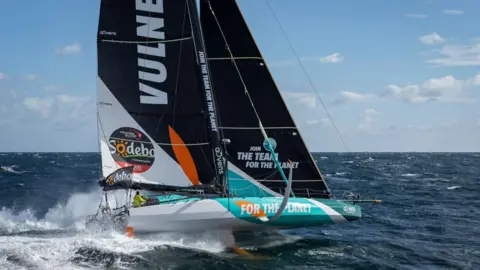 Pierre Bouras
Pierre BourasSailor Sam Goodchild, 35, is weeks away from completing the gruelling 28,000 mile (45,000km) Vendee Globe race around the world.
It is the first time the skipper from Falmouth has entered the solo non-stop race, which was a childhood dream of his.
Goodchild said it had been "non-stop relentless" as he raced his yacht Vulnerable to the finish line while in fourth position in the South Atlantic.
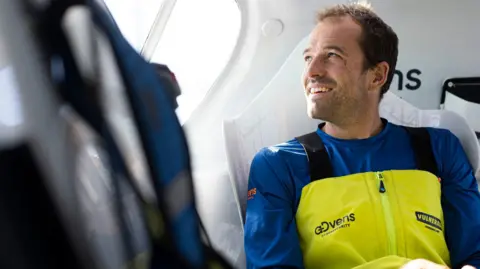 Sam Goodchild
Sam GoodchildGoodchild was brought up on boats, living with his family aboard a yacht in the Grenadines in the West Indies until the age of seven.
So boating was in his blood, but he soon showed he also had the right stuff to beat the best sailors in the world.
In 2023, he won a series of podium finishes and a championship that helped earn him a place on the Vendee Globe, regarded as a pinnacle of ocean racing.
The race, which started last November, also marks the longest time he has spent at sea on his own, easily beating his longest previous time of 12 days.
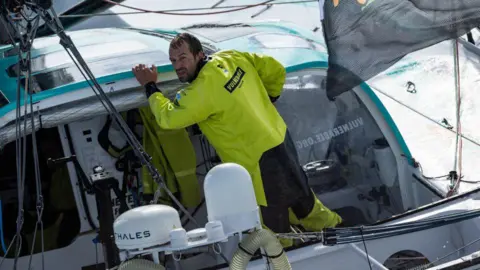 Pierre Bouras
Pierre Bouras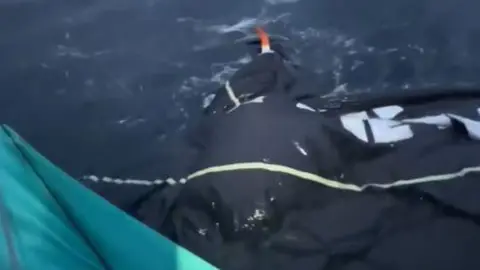 Sam Goodchild
Sam GoodchildWith winds of about 50mph (80km/h) and 16ft (5m) waves, keeping the boat in one piece has sometimes been a challenge in itself.
But, waking up on 22 December in the South Pacific, Goodchild found a sail was dragging in the water - a potentially disastrous situation in rough messy seas.
"I heard something go wrong and ran up on deck, and then you see the sail half wrapped around the foil, which is under the boat," he said.
The curved foils on either side of the boat help it go faster being lifting the hull out the water.
He said: "I thought, how am I going to figure this out.
"I obviously don't want to leave the sail where it is - it's 180 square-metres, so trying to get out the water, it's like a fishing net with tonnes and tonnes of water in it.
"Fortunately, I found a way to get it on board.
"It took over an hour, and I was knackered at the end of it, but it was a very special moment when you manage to achieve something like that.
"And, actually, the sail's back up there, and I'm still using it, so I'm happy to have made the effort."
Vendee Globe
- It is a single-handed, non-stop, unassisted round-the-world yacht race
- Forty boats started from Sables d'Olonne in France on 10 November
- The route takes sailors around the Cape of Good Hope off South Africa, Cape Leeuwin in Australia and Cape Horn at the southern tip of Chile and back to Sables d'Olonne
- Three UK sailors started in the 2024/25 event: Sam Goodchild, Samantha Davies, and Pip Hare, who was forced to retire after her boat was dismasted
- British sailors Dame Ellen MacArthur and Alex Thomson came second in the race in 2001 and 2016, respectively
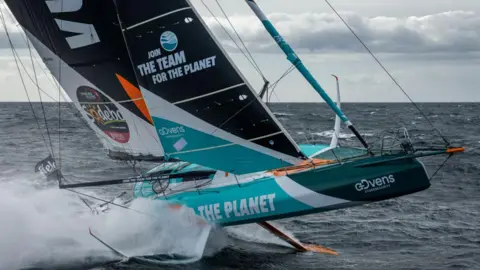 Pierre Bouras
Pierre BourasSailing as fast as possible while looking after the boat and himself had been a "massive challenge", he said.
"It's three or two-and-a-half months sailing non-stop on quite a technical boat, so you're trying to keep it all in one piece, whether that's sails in the water or the autopilot breaking.
"And, in between all that, you're trying to find the right balance of racing and looking after the boat and looking after myself.
"It's relentless, it never stops, day and night, especially in the Southern Ocean, where the waves and the winds are strong for weeks on end."
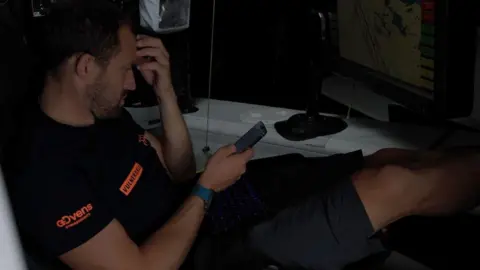 Pierre Bouras
Pierre BourasHow does he sleep?
Goodchild has an autopilot which is keeping the boat on course as he sleeps.
In the spartan cabin of Vulnerable, he has a bunk, a pillow and a yellow sleeping bag "if I'm confident and everything's well", he said.
The second option is a seat moulded to his body shape, "so it's quite comfortable".
"I've got a computer screen here and access into the cockpit to get out," he said.
"They key is getting the boat in a situation where you're confident that as little as possible can go wrong and you're ready to react if something changes."
What does he eat?
"Some people call it astronaut food," he said.
"So you've either got boil-in-the bag, let's say chicken teriyaki with Chinese noodles. That'll be for lunch.
"And for dinner that is a couscous with lamb.
"I force myself to eat hot because it's cold and we're putting a strain on the body.
"You can't let a lack of sleep and a lack of calories accumulate."
What is top of his playlist?
"Definitely Bob Marley," he said.
"I listened to a little bit of reggae to try and chill things out a bit."
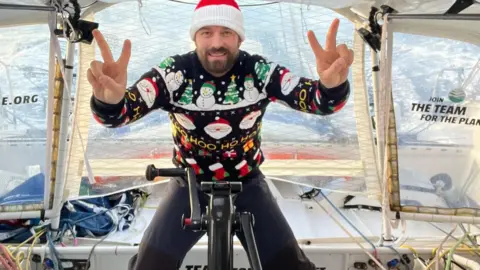 Sam Goodchild
Sam GoodchildChristmas Day came around as he neared the Cape Horn off South America and he celebrated with a cake from his mother.
"It was great to share that moment," he said.
"Picking one special moment is quite hard because just being here and doing the race is pretty special, to be honest.
"It's something I've worked a long time towards and I try to appreciate that quite regularly, because it's not always easy, it's not always fun, but it's an enormous opportunity and I'm very fortunate, very lucky to be here.
"There are just moments where you think we're pretty lucky to live in these situations.
"Last night, we're in the middle of the South Atlantic, and there's no light pollution and we could see just the crescent of the moon and the planets and the stars swelling around.
"And wildlife as well, lots of albatrosses in the Southern Ocean, which fly around the boat and they'll just spend hours and hours, sometimes even days, just just following you.
"So it's a pretty unique experience that not many people have the opportunity to experience."
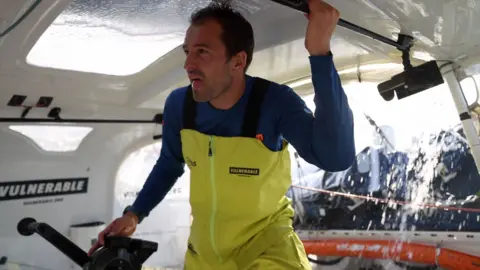 Mark Lloyd/TR Racing
Mark Lloyd/TR RacingWith the end in sight, he's looking forward to being at home.
"Home in terms of family and catching up with my wife and kids, and home in terms of just peace and quiet," he said.
"I mean, sitting down at a table having a coffee, eating with a knife and fork on a plate which doesn't move, having a shower, lying down a bed for a full night, just the simple elements of home.
"So, yeah, it's a great experience, and I'm glad to be here; and I'll be very glad to arrive as well."
Follow BBC Cornwall on X, Facebook and Instagram. Send your story ideas to [email protected].
